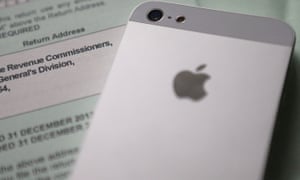 |
| The EU has been investigating whether Apple’s tax deals with Ireland, which allowed the company to pay very little tax on income earned throughout Europe, amounted to state aid. Photograph: Niall Carson/PA |
The US has warned the European commission that it will consider retaliating if Brussels goes ahead with plans to demand billions of dollars in unpaid taxes from Apple and other US multinational companies.
The Obama administration warned the EU on Wednesday that its investigations into alleged tax avoidance by US firms, including Apple, Amazon and Starbucks, could “create an unfortunate international tax policy precedent”.
In a white paper commissioned by US Treasury secretary Jack Lew, the US warned that Brussels was overstepping its powers and becoming a “supranational tax authority”.
The US warned that if Brussels pushes ahead with threatened plans to demand as much as $19bn (£14.4bn) from Apple for alleged unpaid taxes as a result of so-called sweetheart deals with Ireland the US Treasury will “consider potential responses”.
The EU has been investigating whether Apple’s tax deals with Ireland, whichallowed the company to pay very little tax on income earned throughout Europe, amounted to state aid. The commission is expected next month to rule on the case, the biggest single corporate tax avoidance investigation.
Investment bank JP Morgan has warned that if the commission requires Apple to retroactively pay the Irish corporate tax rate of 12.5% on the pre-tax profits it collected via Ireland it could cost the company as much as $19bn.
A US Senate investigation in 2013 found that Apple paid little or no tax on profits of at least $74bn over four years by exploiting gaps in the Irish and American tax code. The investigation found no evidence of illegal activity and both Apple and Ireland deny any wrongdoing.
Tim Cook, Apple’s chief executive, has called the investigations “political crap”. “There is no truth behind it,” he said. “Apple pays every tax dollar we owe.”
In its final warning to the EU before the expected ruling, the US Treasury accused Brussels of a “shift in approach [that] appears to expand the role of the Commission beyond enforcement of competition and State aid law ... into that of a supranational tax authority that reviews member state transfer price determinations”.
“The US Treasury Department continues to consider potential responses should the Commission continue its present course,” the white paper warned in the US’s strongest language to date. “A strongly preferred and mutually beneficial outcome would be a return to the system and practice of international tax cooperation that has long fostered cross-border investment between the United States and EU member states.”
The threat that the US may retaliate against the EU comes shortly after Lew flew to Brussels for talks with the EU’s competition commissioner Margrethe Vestager on “transatlantic cooperation”.
Vestager has already demanded €20m-€30m in back taxes from Starbucks and Fiat Chrysler after ruling the firms struck illegal tax deals with the Netherlands and Luxembourg. The commission is also pursuing a similar investigation against Amazon.
Lew has accused the commission of “targeting US companies disproportionately”. The commission denied this on Wednesday, saying its investigation “applies to all companies operating in Europe – there is no bias against US companies”.
The EU estimates that corporate tax avoidance costs member states €50m-€70bn a year in lost taxes.
The US Treasury warned that American taxpayers could end up footing the bill if the commission goes ahead and demands back taxes from Apple and other US companies as the firms may be able to offset the EU-demand taxes against US tax payments. It described this potential outcome as “deeply troubling, as it would effectively constitute a transfer of revenue to the EU from the US government and its taxpayers”.
The white paper said the commission’s demand for retroactive tax payments “sets an undesirable precedent that could lead to other tax authorities, particularly those in developing countries that look to the EU as a model, to seek large and punitive retroactive recoveries from both US and EU companies”.
Cook has said Apple will “obviously appeal” the commission’s ruling if the company doesn’t get a fair hearing.
“It’s important for everyone to understand that the allegation made in the EU is that Ireland gave us a special deal. Ireland denies that. The structure we have was applicable to everybody – it wasn’t something that was done unique to Apple. It was their law,” Cook told the Washington Post earlier this month.
“And the basic controversy at the root of this is, people really aren’t arguing that Apple should pay more taxes. They’re arguing about who they should be paid to. And so there’s a tug of war going on between the countries of how you allocate profits.”





0 Comments